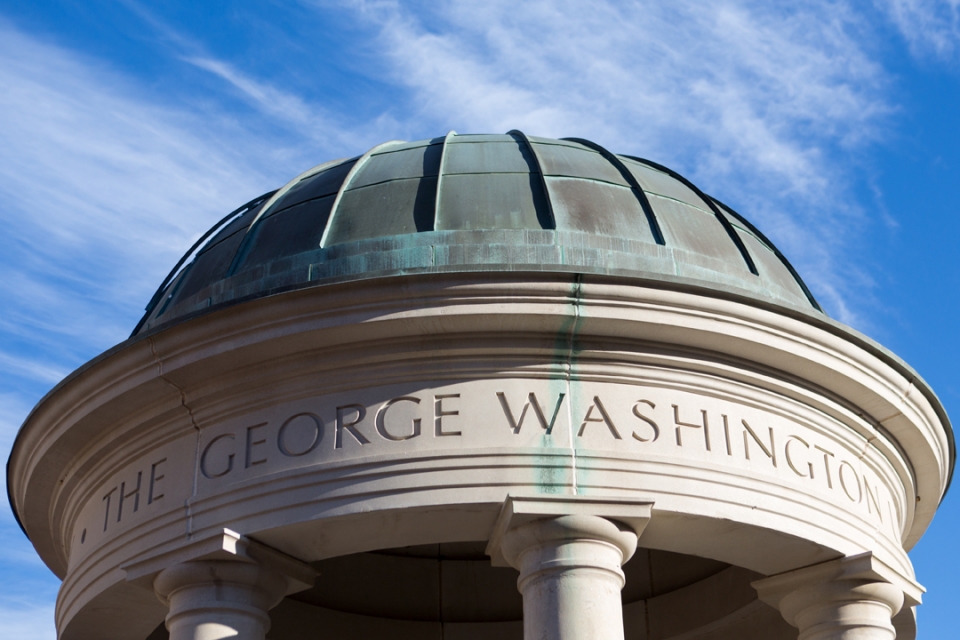By B.L. Wilson
As the Elliott School of International Affairs approaches its 30th year, Dean Reuben Brigety II assured trustees, alumni, faculty and students at his state of the school presentation Thursday evening that “the school is strong, as strong it has ever been.”
He was introduced by graduate student Dorothee Stieber, a Fulbright scholar from Germany and M.A. candidate in global communication.
Ms. Stieber credited Dr. Brigety’s leadership in creating at Elliott School a special place to prepare for excellent service that has a meaningful impact on the world.
“It takes a place for thorough studies, for international perspectives and honest debate, for interdisciplinary dialogue,” Ms. Stieber said. “But also the courage to question and even turn around when new approaches are needed.”
Dr. Brigety said that there is “no better or more important time to be an international affairs professional.
“The world is always in need of strong leaders who have the skills, the experience and the ethical underpinnings to bring about peace and stability in our world,” he said.
“The school is assembling the components of an unparalleled graduate and undergraduate education of incredible depth and breadth to meet that challenge,” the dean continued. In the past two years, the school has added an Institute for African Studies and the GW Career Institute for Disaster and Fragility Resilience to the 11 regional institutes for academic research already in place.
The Institute for Disaster and Fragility Reslience’s work with UNICEF at Bidi Bidi, the world’s largest refugee camp in Uganda, according to Dr. Brigety, “represents the cutting edge in new approaches to disaster preparedness in developing countries.”
Among other achievements in 2017, the dean noted that faculty secured $10.4 million in research grants.
The Elliott Undergraduate Scholars program has been revamped, making it possible for students to share findings in publications and at conferences from research conducted around the world on issues such as environmental change and social media and radicalization.
Six Elliott School International Affairs students were singled out for special recognition for being exceptional in studies or student life:
- Dorothy Steiber, a Fulbright Scholar, worked at Germany’s Bundestag and the European Parliament and was involved with refugees and building community during the 2016-2017 refugee crisis.
- Sean Knudsen, a senior and president of Sigma Iota Rho, the international affairs honor society, speaks fluent Mandarin and is the leader of the GW Alternative Breaks program.
- Helena Iserhard, a junior international student from Brazil, has a minor in chemistry, focusing on global public health and plans to attend medical school after graduation.
- Andre Lama, a junior midshipman in the U.S. Naval Reserves, is president of Delta Phi Epsilon, the professional foreign service fraternity, and also helps organize the GW-hosted model United Nations for Washington, D.C., area high school students.
- Matthew Eady, a freshman, is a member of GW THINK, which provides students an opportunity to study and become involved in human rights in North Korea.
- Ashley McGeary, a master’s degree student, spent the past six months as a Freeman Fellow in South Korea, helping North Korean refugees. She is now an intern at Vox News.
Chris Kojm, the former chairman of the National Intelligence Council, has been chosen as the first director of the Elliott School’s LEAP Academy to prepare future leaders to deal with ethical issues. “Embedding the practice of ethics in the curriculum,” Dr. Brigety said, “is what sets the Elliott School apart.”
A record number of Elliott School students were selected as finalists for the President’s Management Fellowship, a development program for entry into the federal workforce.
Looking toward the future, Dean Brigety said the school hopes to collaborate with other GW departments in developing innovative joint programs in business, the use of technology and data analytics in humanitarian and counter terrorism, and the social sciences.
He announced that Edward “Skip” Gnehm, B.A. ’66 and M.A. ’68, who has a long and distinguished foreign service career, would be stepping in as vice dean to take over from Vice Dean Edward McCord, who will serve during the transition as an adviser.
During the question-and-answer session, moderated by Ms. Steiber, former U.S. Ambassador to the United Nations John Negroponte, a visiting professor at GW, asked why there was no special institute devoted to the study of Latin America.
Dr. Brigety said it is his hope to create institutes for all regions.
As the evening came to a close, one student asked how students could “stay clear” of the turmoil outside the university walls. The dean urged them not to avoid the battles, explaining that the university was designed to help them determine what they believe so that they can engage with others.
“We are living through an increasingly polarized time," he said, "that requires more and more civic courage."




